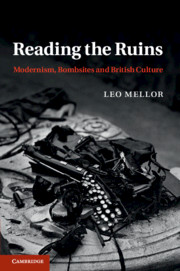Summary
When the novelist Sarah Waters wished to move from her elegant pastiches of Victoriana to a rather more modern narrative, she set The Night Watch (2006) in London during the Second World War – and its aftermath (but with time running backwards from 1947 to 1944, and ultimately to 1941). Bombs fall and characters run, hide and make love. One, notably, is an ambulance driver, emulating Rose Macaulay’s job throughout the Blitz. Macaulay is herself credited as an influence by Waters, especially for the correlation of moral and physical chaos. Alongside the reversed unspooling of the narrative comes another part of the novel’s revisionist manoeuvre, since it offers thoughts from characters that could not have been admitted to, let alone published, in the 1940s. This comes to particular visibility in the attitudes to the bombsites they live and work amongst:
Julia picked up the cups and led Helen a little way off, to a heap of sandbags underneath a boarded window. The bags had the sun on them; they smelt, not unpleasantly, of drying jute. Some had split and showed pale earth, the limp remains of flowers and grass. Julia pulled on a broken stalk. ‘“Nature triumphant over war”,’ she said, in a wireless voice; for it was the sort of thing that people were always writing about to the radio – the new variety of wild flowers they had spotted on the bombsites, the new species of bird, all of that – it had got terribly boring.
This scene is more complicated than it might initially appear; for it is both a salutary corrective to the romanticisation of the bucolic bombsite – and yet it is only possible because such rhetoric of organicist transformation, perhaps the most disconcerting part of a modernist inheritance, and (over)loaded with political and aesthetic import, was present when the novel was set – and is still recognisable to us now.
- Type
- Chapter
- Information
- Reading the RuinsModernism, Bombsites and British Culture, pp. 203 - 204Publisher: Cambridge University PressPrint publication year: 2011



